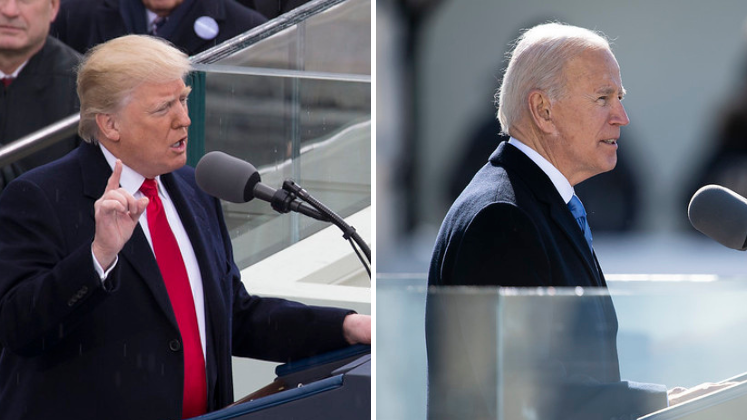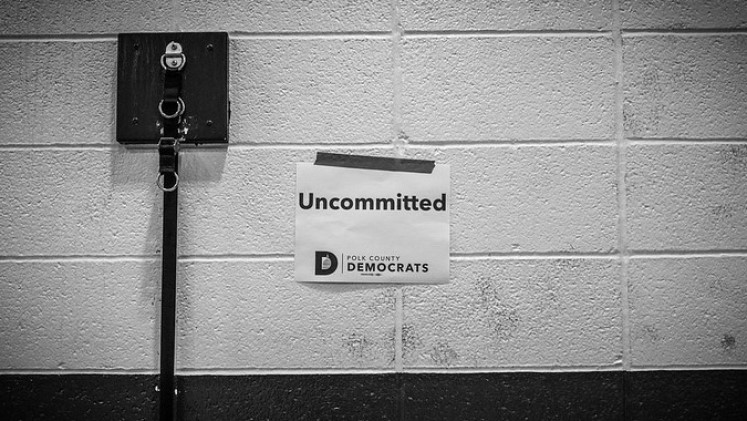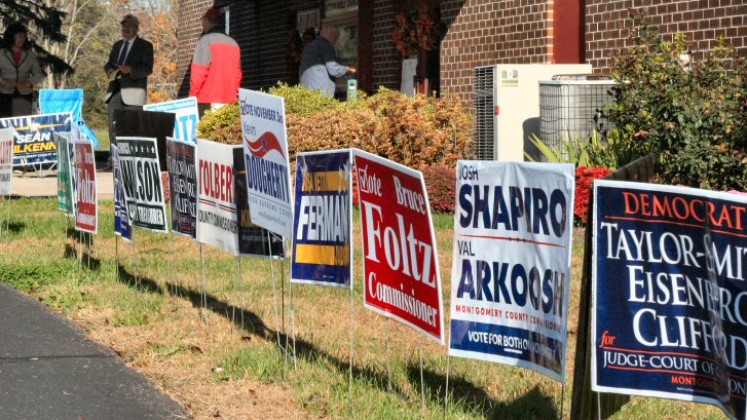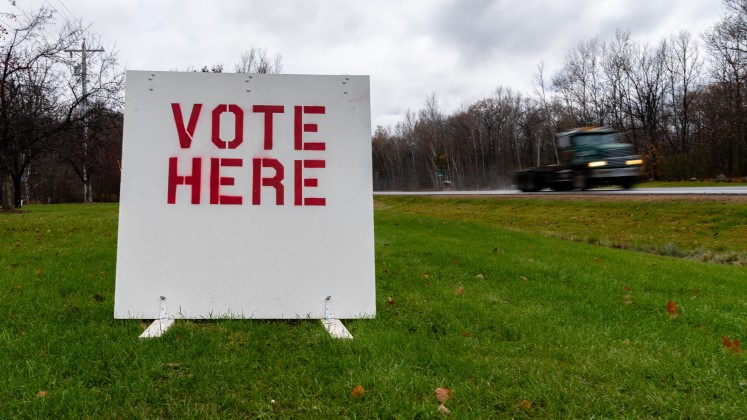 Ahead of the November 2024 presidential election, the Republican Party has a busy calendar involving candidate debates, off year elections, the primary contests themselves, and a nomination convention. Peter Finn maps out the upcoming calendar.
Ahead of the November 2024 presidential election, the Republican Party has a busy calendar involving candidate debates, off year elections, the primary contests themselves, and a nomination convention. Peter Finn maps out the upcoming calendar.
- ‘This article is part of ‘The 2024 Elections’ series curated by Peter Finn (Kingston University). Ahead of the 2024 election, this series is exploring US elections at the state and national level. If you are interested in contributing to the series, contact Peter Finn (p.finn@kingston.ac.uk).’
The first candidate debate (minus the most likely candidate as of September 2023, former president Donald Trump) for the 2024 Republican Party presidential nomination took place on August 23 in Milwaukee, Wisconsin. It featured eight candidates (listed by speaking time as tracked by CNN): former Vice-President Mike Pence, Vivek Ramaswamy, former New Jersey Governor Chris Christie, Florida Governor Ron DeSantis, Former South Carolina Governor Nikki Haley, US Senator Tim Scott, North Dakota Governor Doug Burgum, and former Governor of Arkansas, Asa Hutchinson. This debate followed on from the ‘Fair Side Chats’ hosted by Kim Reynolds, Republican Governor of Iowa, at the Iowa State Fair that saw Reynolds speak with multiple candidates including Ramaswamy, Haley, and DeSantis.
August – November 2023: Three debates
The second Republican Party debate occurs on September 27, 2023, at the Ronald Reagan Presidential Foundation and Institute in Simi Valley, California. To qualify, candidates must have donations from 50,000 donors, with at least 200 donors coming from 20 separate states. They must also have gained three percent in at least two national polls. This is a ratcheting up of the requirements from the first debate. As of September 17 DeSantis, Ramaswamy, Haley, Pence, Christie, and Scott, appear to have qualified for the debate.
The third debate will take place at the University of Alabama in Tuscaloosa in late October-early November 2023, though, as of mid-September, more specific details have not been released.
Table 1 – Republican Party Presidential Candidate Debates, as of Mid- September 2023
| Date | Location | Number of candidates involved |
|---|---|---|
| August 23 | Fiserv Forum, Milwaukee, Wisconsin | 8 |
| September 27 | Ronald Reagan Presidential Foundation and Institute, Simi Valley, California | 6 appear to have qualified as of 17/09/23 |
| Late Oct-Early Nov | University of Alabama, Tuscaloosa, Alabama | ? |
There will presumably be further debates in the coming months, and as the Republican primary process begins in mid-January, they will begin to intersect with the formal selection process. Questions remain over whether Trump will eventually take part in the debates, and what part the debates, and the ratcheting up of the criteria for taking part in them, will play in the winnowing of the field into a smaller number of candidates.
2023: Off year elections
Though most US elections occur in even presidential or midterm years, there are elections in odd years, often called off year elections. In November 2023, there are off year gubernatorial elections scheduled in Kentucky, Louisiana, and Mississippi that will see Republican candidates pitted against Democrats (though the picture is more complex in Louisiana due to its primary system, see below).
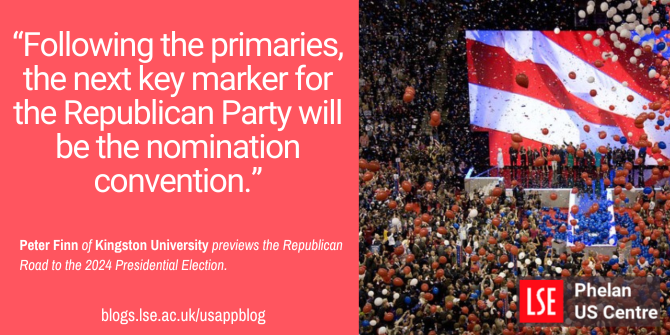
“Balloon drop” (CC BY-NC 2.0) by US Department of State; GPA Photo Archive / Carol M. Highsmith / Library of Congress
On November 7 Kentucky incumbent Governor Andy Beshear (Democrat) faces Daniel Cameron (Republican). In an earlier series post Anne Cizmar of Eastern Kentucky University highlighted that ‘Despite the rightward movement in [Kentucky] […], Beshear was elected as governor in 2019. Facing re-election this year, he easily secured the Democratic nomination this past May, winning more than 90 percent of the vote in the primaries. He also won a clear majority in all counties around the state.’ Cizmar notes, meanwhile, that Cameron is a ‘formidable challenger. He already holds statewide office as Attorney General and has considerable name recognition in the state. He is the first Black official that was elected to statewide office in Kentucky. He also boasts former President, Donald Trump’s support, and connections to the state’s US Senator Mitch McConnell. As Attorney General, he made headlines for combating Beshear’s COVID-19 era executive orders.’
Also on November 7, in Mississippi, following a convincing primary victory in August, Mississippi Governor Tate Reeves will face Northern District Public Service Commissioner, and former Mayor of the town of Nettleton, Brandon Presley. Focusing his campaign on economic issues, Presley says that ‘Tate Reeves doesn’t care anything about us. He doesn’t care anything about working people’. Meanwhile, Reeves critiqued the national focus on the race within the Democratic party, saying ‘[t]hese national Democrats think they can use him [Presley] to inject their liberal ideology into Mississippi under the guise of being a moderate’.
Finally, presuming a state (as opposed to a party specific) primary on October 14 does not lead to a winner via a candidate gaining over 50 percent of the vote, then the top two candidates, irrespective of party affiliation, will face each other on November 18 in Louisiana. An ungainly 16 candidates are running in the state primary. Current Democratic Governor John Bel Edwards is term limited.
Table 2 – Details of 2023 Off Year Gubernatorial Elections
| State | Date | Candidates |
|---|---|---|
| Kentucky | November 7 | Dems: Incumbent Governor Andy Beshear Reps: Daniel Cameron |
| Mississippi | November 7 | Dems: Northern District Public Service Commissioner Brandon Presley Reps: Incumbent Governor Tate Reeves |
| Louisiana | October 14, November 18 | State (not party) primary Oct 14. Top two in primary on November 18 ballot if no candidate gets over 50 percent in primary. |
January – June 2024: Primaries
Beginning in mid-January 2024 with the Iowa Caucus and through to the Virgin Islands in early June 2024, the Republican Party primaries will determine which candidate the party puts forward for the presidential election in November 2024. As of September 2023, it appears the most likely winner of this process is former President Donald Trump, given his current dominant position in the Republican polls. Though as detailed above, there are plenty of others waiting in the wings should something prevent Trump being able to accept the nomination. Bar an issue with Trump’s health, or perhaps the sheer weight of legal pressures from the multiple cases against him, the most likely outcome at present is that Trump sweeps all-comers and by Super Tuesday he has an unassailable lead in the Republican party primary process. Table 3 below shows the Republican party primaries and caucuses up to Super Tuesday in early March.
Table 3 – 2024 Republican Party Presidential Primary Calendar up to Super Tuesday
| State | Date | Primary or Caucus |
|---|---|---|
| Iowa | January 15 | Caucus |
| New Hampshire | January (not confirmed) | Primary |
| Nevada | February 8 | Caucus |
| South Carolina | February 24 | Primary |
| Michigan | February 27 | Primary |
| Idaho | March 2 | Caucus |
| District of Columbia | March 3 | Primary |
| North Dakota | March 4 | Caucus |
| Super Tuesday: Alabama, Alaska, Arkansas, California, Colorado, Maine, Massachusetts, Minnesota, North Carolina, Oklahoma, Tennessee, Texas, Utah, Vermont, Virginia | March 5 | Primaries (except Utah, which has a caucus) |
Table source: 270toWin
July 2024: Nomination convention and presidential candidate debates
Following the primaries, the next key marker for the Republican Party will be the nomination convention. As with the first Republican Party candidate debate in August 2023, and the 2020 Democratic Party nomination convention (though due to the COVID-19 pandemic, this was largely an online affair), this will take place in Milwaukee, Wisconsin at the Fiserv Forum and Wisconsin Center District convention campus on 15-18 July 2024.
If Trump and Biden (or whoever replaces them if they are unable to run) agree, there will be a short series of Presidential candidate debates in the early autumn of 2024. Such debates will likely be pitched as a final steppingstone to the presidential election on November 5.
- Please read our comments policy before commenting.
- Note: This article gives the views of the author, and not the position of USAPP – American Politics and Policy, nor the London School of Economics.
- Shortened URL for this post: https://bit.ly/46dBTUg


